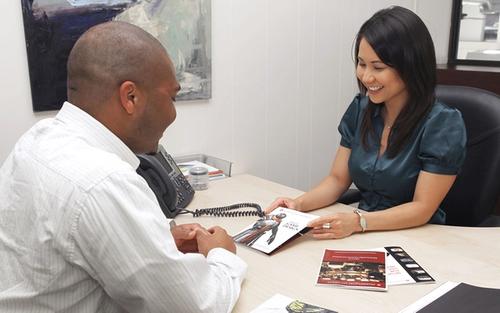
Parent Handbook
An overview of what to expect for both you and your student.
Student Services
Academy Resource Center (A.R.C.)

Find help with accessibility, writing, speaking, tutoring, and more. Access a wide variety of online and on-campus support services including:
- Study groups
- Workshops
- Writing and speech labs
- Academic support
- English as a Second Language support
- Accommodations for students with disabilities
In addition, the A.R.C. can provide referrals to community resources including medical, dental, vision, and mental health services.
The Transition to the Academy of Art University
Student Goals & Expectations

As a family member, you are vital to your student's success at the Academy of Art University. As an important source of information, guidance, and advice for your student throughout the college years, we expect your student to be prepared to handle their new responsibilities as a college student. You should be aware of the expectations of each student, and we ask for your support in reinforcing these expectations:
We expect students to act as responsible adults. This implies that students use time management skills to ensure they attend all classes fully prepared and on time.
We expect students to register for classes with the assistance of our professional academic advisors only, and not their parents or family members. It is our goal for students to build a relationship with their advisors as well as learn the necessary skills to register on their own in the future.
We recognize the importance of communication between family members and you still have a considerable amount of influence with your student. By talking with and listening to your student, you can offer information, support, and guidance. We encourage you to talk with you student about what it means to take on these adult responsibilities, your expectations for their behavior, and your expectations for how your student will keep you informed about his or her university experience. By discussing these expectations, you can help ensure that you and your student fully understand the expectations of the University community.
Campus Life
The biggest challenge for parents and first year students is the change in their relationship. It’s a delicate balance between giving them roots and wings–continuing to be one of their primary sources for support while allowing them to experience opportunities for growth and personal development.
Often, students are more ready for this change than parents are. Below are some ways you as the parent can continue to provide support while "letting go":
Stay in Touch
Although new college students are eager to experience independence, most wish to maintain family ties. Don’t mistake a surge of independence for rejection. Most students welcome news from home.
Encourage Involvement
Urge your student to get involved in activities that interest them—these opportunities serve as an anchor in their new environment and help ease the transition.
Be Supportive
When life becomes overwhelming, many students call home to vent to someone who will listen. Avoid the urge to solve their problems–listen and express your belief in their ability to sort it out.
Expect Change
College experiences can trigger inevitable change in behavior. Your student will largely be the same person you raised and sent away, yet if you’re hoping for a big change, don’t expect too much too soon. Maturation is not an overnight process.
Trust Your Student
Finding oneself is difficult enough for young adults without feeling second-guessed or controlled by the people whose opinions they respect most. Trust them to do the right thing.*
*Adopted from the USC parent handbook and the National Orientation Directors Association
Managing this transition successfully is critical to improving a student’s chance for success at the University. While it’s difficult to see your student facing life’s challenges, it’s important not to jump in at the first sign of distress to visit or invite them home. These are opportunities to help your student discover who they really are, what they’re really capable of and often, this is the first time your student will have make vital decisions that affect their daily lives and their future. However, this transition will lay the groundwork for the next major change in their life—the transition from college to career.
Academic Success
Tips for Academic Success
Adjusting to college life presents new challenges for students, particularly those in their first year at university. Ultimately, their academic success or failure is up to the students themselves, and there are a number of steps that can be taken by students to ensure their experience on campus is a fulfilling one.
Time Management and Planning
Unlike high school, students must establish and take responsibility for their own schedules in college. Possibly for the first time, students must be self motivated and exercise self discipline to create a workable plan for themselves. Elements to factor in include:
- Allow 2-3 hours of study time for every hour in class
- Study to learn, not just “pass the test” or get through the assignment
- Approach large projects by breaking them down into manageable sections
- Focus on clearly expressing yourself in both written and verbal communication
- Preparation • Be prepared! Study for exams well in advance
- Take time to fully develop projects, assignments, papers
- Have all necessary art supplies before you need them
Communication
Stay in frequent touch with Academic Advisors, their input is invaluable to helping students navigate their way
Follow-up in a timely and responsible manner with faculty and staff
If you have questions, concerns, suggestions…let someone know!
Be Well-Rounded and Open-Minded
College presents a variety of new ideas and experiences–be willing to learn from others and be open to new ideas and concepts.
There is time for everything–be sure to make time for friends, family, social activities, community events, exercise and stress management. The most successful students are those that are actively engaged in all aspects of life, not just the academic side.
Academy Resource Center (ARC)
Find help with accessibility, writing, speaking, tutoring, and more. Access a wide variety of online and on-campus support services including:
- Study groups
- Workshops
- Writing and speech labs
- Academic support
- English as a Second Language support
- Accommodations for students with disabilities
In addition, the A.R.C. can provide referrals to community resources including medical, dental, vision, and mental health services.
Academy of Art University Library
Thousands of inspirational art books and a massive slide library of images–all available to students.
Career Services
Watch a career development chat, attend an Industry On Campus event, and find guides to resumes, networking, and more.
Access to Your Student's Information
The Family Educational Rights and Privacy Act of 1974 (FERPA) is a Federal law that protects the privacy of student education records, including the right to have information contained in their university record kept private.
Academy of Art University makes it a practice not to disclose any information from a student’s education record without a signed authorization form on file. However, FERPA allows schools to disclose those records, without consent, in specific situations, as outlined in FERPA. More detail on FERPA can be found in our Privacy Policies.
University students are expected to assume responsibility for their student record, and we encourage parents to take this opportunity to facilitate the change required as your student makes the transition from high school to college. Advise your student to keep a calendar of assignments, appointments, events and deadlines, and to communicate regularly with you, but avoid taking care of these things for them–allow them to handle this new responsibility on their own, while being a source of advice and support.
Money Matters
There are four primary charges billed directly to students by Academy of Art University:
- Tuition - Course fees
- Housing
- Meal plans
Housing and meal plans must be paid in full before the student moves into a campus residence. Tuition charges and course fees may be divided into four payments using the Interest-Free Four-Month Installment Plan.
Campus Living
Housing
Our campus in San Francisco provides an arts environment unlike anywhere in the world. Students will work and socialize with fellow students and have access to our free courtesy shuttle service around campus. Housing is guaranteed to all new, full-time students, however please note that we cannot guarantee placement in a specific building or room type.
How to Reach Your Student
If you are unable to reach your student directly, please contact the Resident Director. Term Commitment All students who sign up for campus housing for fall semester sign a binding agreement for an academic year or two semesters (fall and spring) with winter break in between. Students who sign up for spring, summer, or the Pre-College Summer Program sign individual license agreements only for that semester. We do not offer fall-only license agreements, unless the student can show proof of projected graduation in December.
Parents & Visitors
Parents and visitors are always welcome to visit. Guest hours are from 9 a.m.–10 p.m. on weekdays and 9 a.m.–12 a.m. on weekends. Any overnight guests must be approved through your Resident Director at least one week in advance, and only guests of the same gender as the host are allowed to stay overnight.
Dining
Dining services at Academy of Art University are provided by Sodexo. The 620 Café at Clara Gil Stephens (620 Sutter St.) provides made-to-order meals for students, and are ordered via a touch screen menu. The International House Café at 860 Sutter St. and the Rodin Café at 1055 Pine St. are two other options that provide a more traditional atmosphere to residence hall dining, including daily specials and grill menus. All residence halls offer a salad bar, fountain drinks, and vegetarian options.
Knight Kash is a debit account that is conveniently loaded onto your student ID card, and all meal plans include a Knight Kash option. It can be used anywhere on-campus for meals, as well as at many local merchants in San Francisco.
Transportation
Academy of Art University provides free shuttle service to all residences and academic buildings.
Campus Safety
Our safety department comprises four divisions: a Patrol Team, Host Team, Communication Team, and Crime Prevention Team. Constant monitoring and security tools complement our teams, and safety is our most important priority.
Health & Counseling
Health Net has a student medical insurance plan designed especially for our on-site students. The plan covers office visits, medical, accident and hospital expenses.
Call the Academy Resource Center at 1-415-618-3917 for information on health insurance. ARC only provides information and does not own or run the insurance programs. Coverage may be purchased online through Health Net via the Wells Fargo Student Insurance website.
http://studentinsurance.wellsfargo.com
1-800-853-5899









